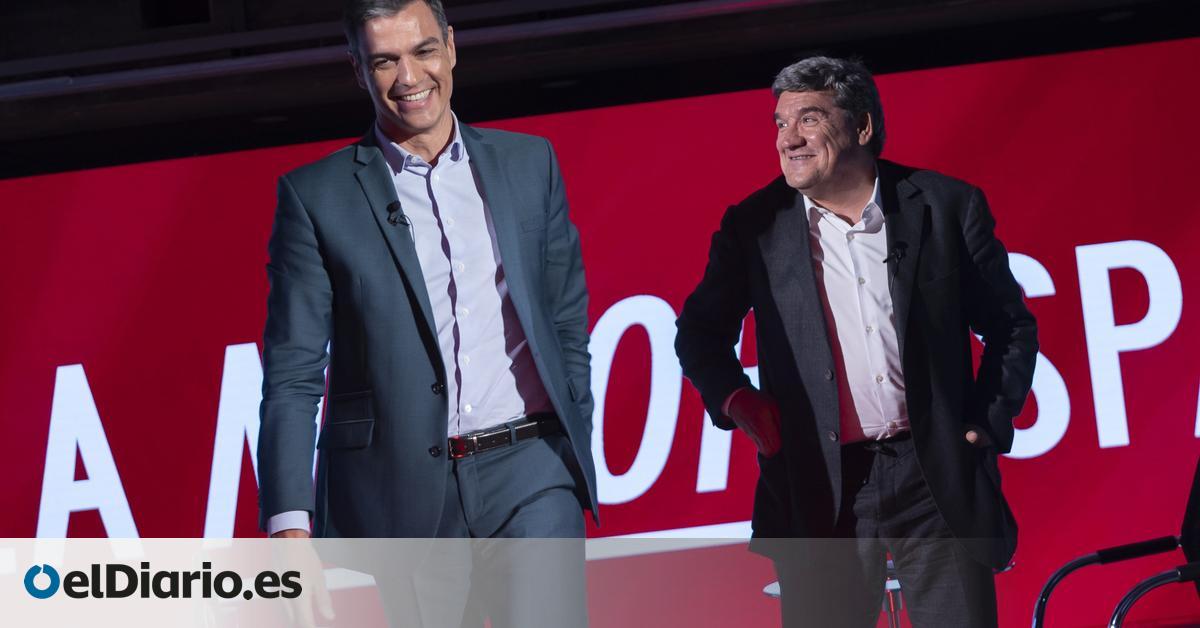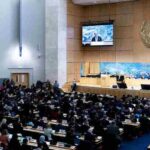
The President of the Government, Pedro Sánchez, has fulfilled his bluff and has decided to appoint the still minister José Luis Escrivá as the new governor of the Bank of Spain. The decision, according to sources in the Executive, is a response to the PP’s refusal to agree on the renewal of the banking supervisor itself, the National Commission of Markets and Competition (CNMC) or the future National Commission of Energy (CNE). In the absence of an agreement, Sánchez decides.
The appointment of the current Minister for Digital Transformation and Civil Service, which the PP has flatly rejected since his name was leaked in July, was taken for granted on Tuesday, coinciding with the unblocking of the election of the new president of the General Council of the Judiciary (CGPJ) and the Supreme Court.
The progressive judge Isabel Perelló will be the first woman to preside over both bodies after achieving the necessary consensus in the plenary session of the governing body of judges, after the PSOE and the PP agreed at the end of July to renew this body after years of blockage by the popular party.
These negotiations ran parallel to those held by the two major parties after the European elections on 31 May to renew other bodies with pending appointments, such as RTVE, the CNMC, the Central Electoral Board, which has been in office for eight months, or the CNE, whose resurrection has been announced by the Executive.
The PP saw in the agreement of the CGPJ closed before the summer the possibility of expanding its margin of understanding with the Government and, in passing, its representation in the bodies that depend on political negotiation. The 50% distribution of the members of the Judiciary allowed them to think of having a greater presence than the parties in the opposition usually enjoy. The PP wanted to assert that, despite the fact that Alberto Núñez Feijóo lost the investiture, they are the first group in Congress and have an absolute majority in the Senate.
But the government’s decision to appoint Escrivá to head the Bank of Spain torpedoes relations, according to the PP. “It strains the relationship” with the government, say the party leadership, and “makes it difficult” to reach future agreements with the CNMC or the National Securities Market Commission (CNMV). It makes things difficult, but not impossible, since the alternative is to remain outside these important regulatory bodies. In Génova they insist that RTVE is outside these conversations.
PP sources say that the choice of the current minister implies that the Executive wanted to “make the agreement impossible” and “do it” without them. The PP has no intention of participating in the renewal of the Bank of Spain so as not to “whitewash” Escrivá’s appointment with a deputy governor from its quota.
In the case of the CNMC, its directors are appointed by the Government at the proposal of the Ministry of Economy, although Congress can later veto them. And in this body, the appointment of five directors, including the vice-presidency, has been pending for months, following the death of Ángel Torres more than a year ago.
The board of the body that oversees free competition is made up of ten members, but there are currently only seven directors in office, including the president, Cani Fernández. There are two members whose mandate expired in September 2023: Bernardo Lorenzo and Xabier Ormaetxea. And another three vacancies need to be filled, including the vice-presidency.
In the case of the CNE, the future energy regulator (eliminated by the PP in 2013 with the creation of the CNMC) should come into operation at the beginning of 2025 if a Royal Decree currently being processed in Congress is in force by then. It is expected to have a council made up of seven members: the president, the vice president and five directors. And in December the mandates of the current president of the CNMV, Rodrigo Buenaventura, and the vice president, Montserrat Martínez Parera, expire. Both were appointed in 2020, although they can renew.
Decision of the President of the Government
With the Bank of Spain law in hand, the President of the Government has the power to appoint the governor (it has never been a woman) of the institution, although traditionally the two major parties have shared the appointments of the posts of governor and deputy governor among professionals of recognised prestige: the opposition appoints the deputy governor, and the Government, the governor. Now Pedro Sánchez has appointed Escrivá despite the rejection of the PP. It is the first time in democracy that a minister of the Executive will go from one day to the next to direct one of the main economic institutions independent of the Government.
The conservatives had already opposed the appointment of Miguel Ángel Fernández Ordóñez as governor in 2006. He had served as Secretary of State under Pedro Solbes in the Ministry of Economy until he was appointed as a supervisory advisor, as a preliminary step to his appointment to head the organisation. Fernández Ordóñez, who had already been a senior official under Felipe González, then chose José María Viñals as his number two, a highly prestigious economist who was then a director of the Bank of Spain. The PP reproached him for the fact that this appointment consummated “the breakdown of consensus”.
Now, the process has been parallel to the agreement to renew the CGPJ, which was closed weeks after the mandate of Pablo Hernández de Cos at the head of the Bank of Spain expired on June 11. De Cos was appointed by Mariano Rajoy’s Executive on May 30, 2018. The appointment was published in the BOE on the same day that the motion of censure that ousted the Galician from Moncloa began to be debated. And it was carried out despite the fact that the mandate of De Cos’ predecessor, Luis María Linde (appointed in 2012) did not expire until a few days later, on June 11, 2018. The appointment was not agreed with the PSOE, although De Cos did not arouse the rejection of the socialists.
Already at the beginning of this summer, the Government stated that it was seeking a new consensus that would extend to the pending appointments at the CNMC, those yet to be made at the CNMV or at RTVE.
The PP appointed its general secretary, Cuca Gamarra, as negotiator, who ruled out from the start any discussion about RTVE. The PP has made public radio and television one of its opposition targets. The current composition of the board of the entity and the distribution of intermediate positions after its previous renewal already allows the PP to directly influence both business and editorial decisions. Something that is not certain if they agree to negotiate the currently vacant seats.
With this position of the PP, the Government put on the table its main candidate for the Bank of Spain: Minister Escrivá. This offer was leaked to the media in July, and Gamarra was expeditious: “Under no circumstances.” Now, the Popular Party is refusing to propose a name for the post of deputy governor. The mandate of the current deputy governor, Margarita Delgado, expires on September 11. And the law of the Bank of Spain states that this position must be appointed by the Government, at the proposal of the Governor.
Escrivá’s name had been on the table since last year, when he moved from holding the portfolio of Inclusion, Social Security and Migration in the previous coalition government to taking over Digital Transformation and Civil Service in the new one, from November 2023. Many saw in that move a step back to gain momentum, precisely with the Bank of Spain as a target. Especially when in December Sánchez chose Carlos Cuerpo as Minister of Economy to cover the departure of Nadia Calviño to the European Investment Bank (EIB).
Escrivá will make his debut on September 11 and 12 at the meeting of the governing council of the European Central Bank (ECB), where he hopes the institution will approve a new cut in interest rates, after declaring that the inflation crisis resulting from the Russian invasion of Ukraine has been overcome.
The man from Albacete has already held various positions at the Bank of Spain itself, at the ECB, at BBVA and at the Bank for International Settlements, in addition to chairing the Fiscal Authority (AIReF) since its creation (it was an appointment by the PP) until 2020, when he was appointed minister.
The PP maintains that the election of Escrivá means that the PSOE is seeking “a distancing” after agreeing on the CGPJ. “The Government has not sought an agreement. They felt defeated and want to distance themselves,” they point out from Génova. In 2021, Pablo Casado agreed on the renewal of the Constitutional Court, the Court of Auditors, the Ombudsman and other constitutional bodies. A few months later he was removed from the party leadership.
Six years
This Wednesday, Minister Carlos Cuerpo will start the procedure for the official appointment of Escrivá as the new governor by announcing it to the relevant committee of the Congress of Deputies. Afterwards, a decree from the President of the Government will have to be presented, which will be published in the BOE and will allow the candidate to take possession before the King. The mandate lasts six years, until 2030.
The move from the Council of Ministers to the central bank is not an exceptional practice in the eurozone, or even in Spain. Luis de Guindos, Minister of Economy in Rajoy’s PP government, left the portfolio to become Vice President of the ECB, a position he currently holds. Before that, the president of the institution, Christine Lagarde, already had experience as a minister in France.
With Escrivá, almost a third of the members of the ECB’s governing council, which includes the governors of each euro area’s central bank and the executive committee of the organisation, will have a past in their respective executives. De Guindos and Lagarde are joined by the governors of the central banks of Austria (Martin Kocher), Greece (Yannis Stournaras), Malta (Edward Scicluna), Portugal (Mário Centeno), Slovakia (Peter Kažimír) and Finland (Olli Rehn).
Source: www.eldiario.es

